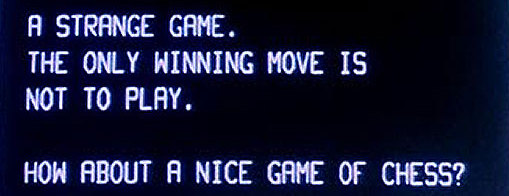A few weeks ago I wrote a post about how some of my favorite people on Twitter seem to be…well, avoiding Twitter…and how that made me kinda sad. This morning I was delightfully surprised to find that Myke Hurley and Casey Liss decided to discuss my post on their podcast Analog(ue).

Boy, was it a great discussion (yes, I’m a listener, and yes, you pronounced my name right!). I think Myke may have summed up the issue best when he broke out that oft-quoted line from WarGames: “The only winning move is not to play.” I totally agree, and also find a bit of dark humor in the comparison between Twitter and Global Thermonuclear War. ;) Here exists a problem at the very intersection of technology and humanity for which there exists no decent, workable solution. Like Casey said, it’s lose-lose. As a fellow loser in this situation, let me just say that I am absolutely on their side. If the choice is between my sense of community and someone else’s overall happiness, my vote is unequivocally for the latter.
Ironically, as I listened to their conversation, I got a strange taste of what Myke and Casey’s lives must be like. For instance, I’ve never heard my own name said out loud so many times. It instantly reminded me of how shy I am, and how while in theory I would love to be a part of the “cool kids club,” I’m not even sure I could handle it. Could I even be myself? Myke and Casey said a lot of really nice things about my post (which of course made me feel good), but what if instead they had torn it apart? I would have felt horrible…and yet, that’s the kind of thing they have to deal with all the time.
With all that said, I do believe there is hope for the future of online communities. This brings me to another good post about Online Relationships by Belle Beth Cooper. Belle’s post really resonated with me because it reminded me of something I think about a lot: when an ever-increasing number of blogs and media outlets are disabling comment sections, where do decent, thoughtful people bring their discussions? I only offer readers one way to contact me on this site, and it’s via Twitter. But what if, like Belle, you no longer use Twitter (or never did in the first place)?
Belle wrote about how she enjoys my blog (Thanks!! I just added yours to my RSS reader!) but didn’t have any way to really reply to what I was saying. I loved this bit from her post:
As I wondered about this today I realised I could use my own blog to post a reply in a sense. In the same way lots of developers weigh in on community issues when they blow up, I could link to Becky’s post and write my own short reply in the form of a post on my own blog.
This feels very old-school to me; something that happened more in the early days of blogging when trackbacks were also a big deal. I wasn’t heavily involved in blogging early on, so I don’t know if this is true, it’s simply a vague feeling I have about this approach. Direct, and yet indirect, communication via blogs. Almost like writing letters to someone whose address you don’t have, and being forced to publish them in the newspaper in the hope that they will see them.
The reason I saw Belle’s post was because I keep an eye on the “Referrals” section of my WordPress stats page. Otherwise, I may have never found it. And that’s…well, sad. I actually really like the idea of back-and-forth blog responses, but I also agree that there has to be a better way.
So this is where I find hope: I think that there are a lot of very smart people who are thinking about and working on this. One of them is Christa Mrgan, co-founder of Civil Comments, a crowd-sourced, moderated comment system designed to create safe, pleasant discussion spaces.
Another is Manton Reece, who has so many insightful things to say about the future of blogging. Manton is working on a microblogging service and app and also co-hosts one of my other favorite podcasts, Core Intuition. On episode 219, around the 30-minute mark, he brings up WebMention, which is a sort of modern replacement for pingbacks that looks interesting. There is also apparently a WordPress plugin for WebMention, so I may try that out and see how it works.
There may be no perfect solutions for the myriad problems that arise in online communities, but I’m confident that there exist better solutions than what we have now. Perhaps the more we talk about it, the closer we’ll get to discovering those solutions. Here’s hoping!
One thought on “Follow-up: The Nuances of Online Discussion”
Comments are closed.